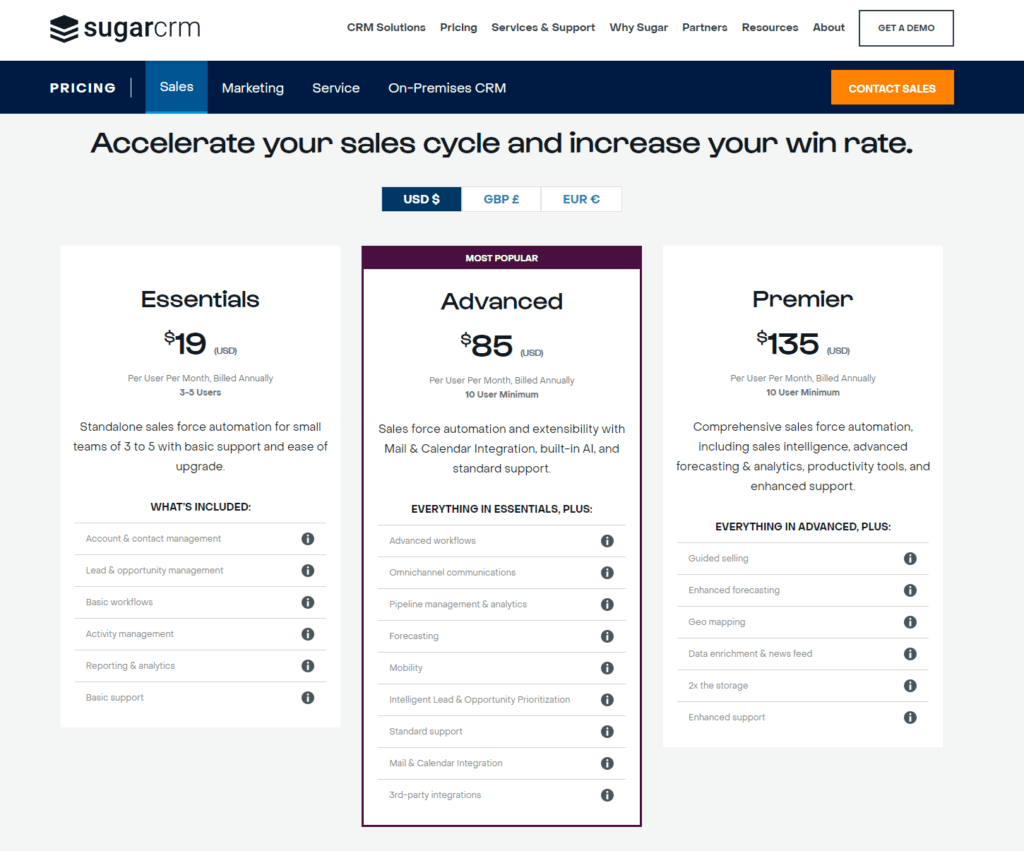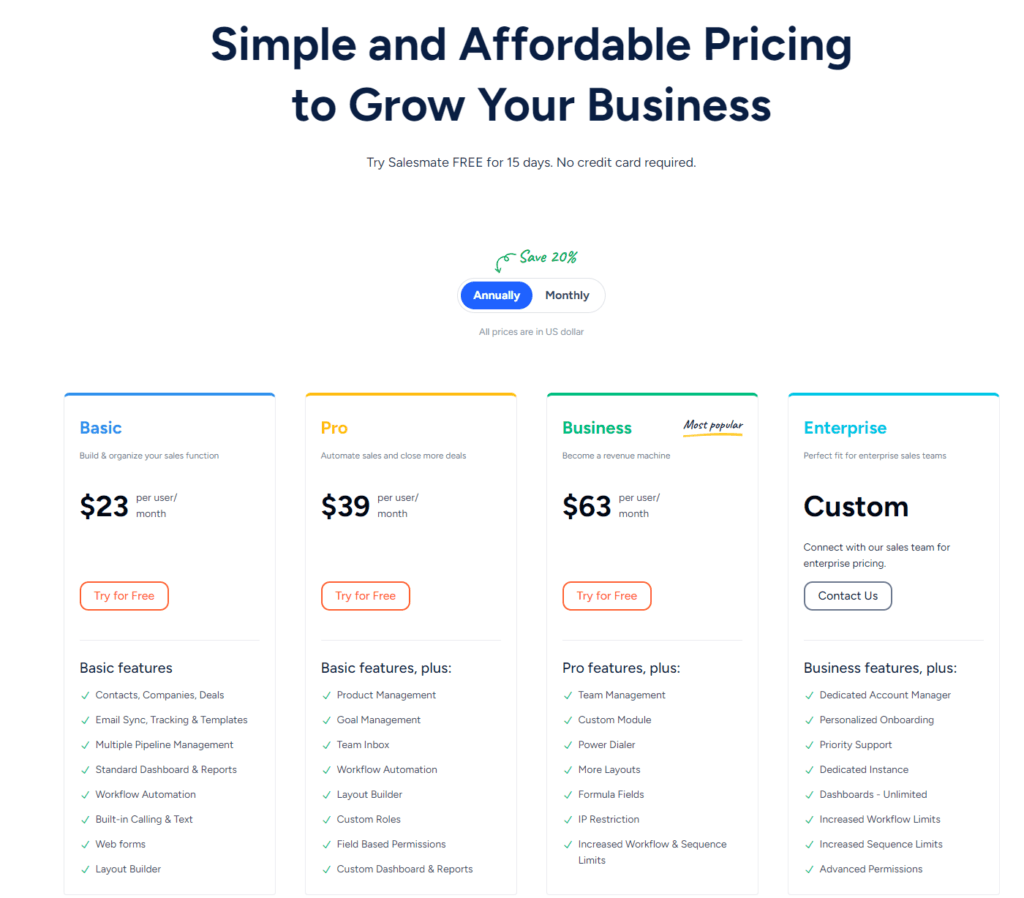In the bustling arena of CRM platforms, where myriad contenders vie for the title of your business’s champion, two notable names often emerge: SugarCRM and Salesmate. Each brings its unique strengths to the ring, poised to help businesses streamline operations, boost sales, and enhance customer relationships. But which contender is the best fit for your business corner? Is it SugarCRM, with its rich history and robust feature set designed for enterprise-level power? Or does Salesmate, with its user-friendly interface and focus on small to medium-sized businesses, claim victory for your team? Let’s dive into this head-to-head comparison, shedding light on the features and flexibilities of SugarCRM and Salesmate, guiding you to make a choice that feels like a tailor-made victory.
| SugarCRM | Salesmate |
|---|---|
 |  |
| G2 Score -3.9 out of 5 | G2 Score -4.6 out of 5 |
| TrustRadius Score -7.9 out of 10 | TrustRadius Score -9.8 out of 10 |
Ease of Use and User Interface: The Gateway to CRM Adoption
A CRM’s user interface and its ease of use can significantly influence how quickly your team can adapt to and embrace the new system. A complicated, non-intuitive UI might hinder your team’s productivity, while a streamlined and user-friendly interface can enhance it.
SugarCRM: Robust but Complex
SugarCRM is designed with a wealth of features to cater to a wide array of business needs, making it a powerful tool for customer relationship management. However, this robustness comes with a level of complexity in its user interface. New users might find SugarCRM’s UI to be less intuitive, requiring a steeper learning curve to navigate efficiently. This complexity can potentially slow down the initial adoption rate and might necessitate additional training for your team to fully leverage the platform’s capabilities.
That said, for businesses with complex CRM needs and the resources for comprehensive training, SugarCRM’s depth and flexibility offer a level of control and customization that can be well worth the initial investment in learning the system.
Salesmate: Intuitive and User-Friendly
In contrast, Salesmate is designed with a focus on simplicity and ease of use. Its user interface is intuitive, making it accessible for teams of all sizes and technological proficiencies. This emphasis on a user-friendly experience does not mean a compromise on functionality. Salesmate provides a streamlined approach to CRM functionalities, making it easier for businesses to implement and adopt the CRM system without extensive training or a significant learning curve.
Salesmate’s UI and overall design are tailored to small and medium-sized businesses looking for an efficient way to manage their customer relationships, sales pipelines, and marketing efforts. For teams seeking a CRM that they can start using effectively with minimal setup time, Salesmate stands out as a compelling choice.
Customization and Flexibility: Tailoring Your CRM Experience
The ability to customize your CRM platform to fit your business’s unique processes and needs is crucial. A one-size-fits-all solution can leave you with unused features cluttering your workflow or, worse, gaps in your capability to serve your customers effectively. Let’s see how SugarCRM and Salesmate stack up in the customization and flexibility arena.
SugarCRM: The Customizable Powerhouse
SugarCRM is often lauded for its high degree of customization. It’s designed to serve a wide range of industries and business sizes, but it truly shines in environments where complex, bespoke CRM solutions are necessary. With SugarCRM, you can tailor nearly every aspect of your CRM experience, from the user interface to the underlying workflow processes. This platform is built for businesses that have specific, nuanced needs that generic CRM solutions can’t satisfy.
The trade-off for this extensive customization capability is complexity. SugarCRM offers powerful tools for those who know how to wield them, but it may require a dedicated administrator or IT support to fully exploit its potential. For larger businesses or those with specific CRM needs that off-the-shelf solutions can’t meet, SugarCRM provides the framework to build a deeply personalized CRM solution.
Salesmate: Streamlined Customization for SMBs
Salesmate, on the other hand, offers a more streamlined approach to customization, targeting small to medium-sized businesses looking for a balance between flexibility and ease of use. Salesmate’s platform allows for significant customization of sales pipelines, communication templates, and automation workflows, all through a user-friendly interface that doesn’t overwhelm.
Where Salesmate excels is in providing enough customization to feel personal and tailored to your business, without the need for extensive technical expertise or resources. It’s an ideal solution for SMBs that want to quickly implement a CRM system that adapts to their sales process, marketing efforts, and customer service workflows, without getting bogged down in technical details.
Automation and Workflow Capabilities: Streamlining Your Business Processes
Automation in a CRM context refers to the system’s ability to take over repetitive tasks, manage workflows, and ensure that your sales, marketing, and service efforts are coordinated and consistent. Effective automation tools not only save time but also help in nurturing leads, closing sales, and enhancing customer engagement. Let’s examine how SugarCRM and Salesmate equip businesses with these capabilities.
SugarCRM: Advanced Automation for Complex Workflows
SugarCRM’s platform is built with the needs of larger enterprises in mind, offering advanced automation capabilities that can handle complex business processes. Its workflow management tools allow for the automation of tasks across different departments, ensuring that leads are nurtured, sales are followed up on, and customer queries are addressed promptly. The flexibility and depth of SugarCRM’s automation features make it possible to customize workflows extensively, tailoring them to the unique needs of your business.
This advanced automation can be a boon for businesses with intricate sales cycles or those that require detailed, multi-step processes to be automated. However, setting up and managing these workflows in SugarCRM may require a higher level of CRM expertise or even dedicated IT support to ensure that the automation serves your business effectively.
Salesmate: User-Friendly Automation for SMBs
Salesmate focuses on providing small to medium-sized businesses with accessible, easy-to-use automation tools that streamline sales and marketing efforts. The platform offers intuitive workflow automation that can significantly reduce the time spent on repetitive tasks, such as sending follow-up emails or updating lead statuses. Salesmate’s automation features are designed to be set up quickly and without the need for extensive technical knowledge, making them ideal for businesses looking to improve efficiency without a steep learning curve.
Salesmate’s approach to automation emphasizes simplicity and impact, ensuring that SMBs can easily implement workflows that drive sales processes and enhance customer engagement. This focus on user-friendly automation makes Salesmate an attractive option for businesses seeking to leverage CRM technology to grow their operations effectively.
Pricing: Assessing Value for Money
A pivotal factor that shapes many businesses’ decision-making process is the Pricing structure of each CRM platform. Understanding how each service is priced, alongside the features and value offered, is crucial for businesses to determine which CRM provides the best return on investment.
SugarCRM: Comprehensive but Premium Pricing

SugarCRM’s pricing strategy is designed to cater to businesses looking for a comprehensive CRM solution with a wide range of advanced features. The platform offers several tiers, starting with more basic offerings that cater to smaller businesses or teams just scaling their CRM efforts, to more advanced packages that include extensive customization, automation, and reporting capabilities for larger enterprises.
SugarCRM’s tiers are generally priced at a premium, reflecting the depth and breadth of functionalities offered. Each successive tier includes more advanced features, supporting businesses as they grow and their needs become more complex. For businesses requiring a high degree of customization and integration with other systems, SugarCRM offers a level of sophistication that can justify the higher cost, especially for medium to large enterprises that can leverage these capabilities to their fullest.
Salesmate: Affordable and Transparent Pricing for SMBs

Salesmate positions itself as an affordable, value-packed option for small to medium-sized businesses. Its pricing structure is straightforward and transparent, with plans designed to provide SMBs with essential CRM functionalities, including sales automation, pipeline management, and customer engagement tools, without breaking the bank.
Salesmate offers a few pricing tiers that scale based on features, users, and the level of customer support. Even at its entry-level, Salesmate provides a robust set of features aimed at improving sales efficiency and customer relationship management. The platform also often includes new functionalities and updates without significant price hikes, making it an attractive option for growing businesses conscious of budget constraints.

Related: Check out our free SEO suite

Integration Capabilities: Enhancing Your CRM with Essential Tools
In today’s digital ecosystem, a CRM doesn’t operate in isolation. Its ability to integrate seamlessly with other business tools—email platforms, social media, accounting software, and more—is critical. These integrations not only streamline workflows but also ensure data consistency and provide a more comprehensive view of customer interactions. Let’s assess how SugarCRM and Salesmate fare in enabling businesses to create a cohesive tech stack.
SugarCRM: Extensive Integration for a Unified Business Environment
SugarCRM is designed with the flexibility to integrate with a wide range of third-party applications and services. Recognizing the diverse needs of larger enterprises and the variety of tools they use, SugarCRM offers robust API support, allowing for deep, custom integrations that can knit together different aspects of a business’s operations. From marketing automation tools and social media platforms to financial systems and customer service software, SugarCRM aims to act as a central hub, bringing disparate systems into a unified business environment.
This extensive integration capability is a powerful feature for businesses that rely on a complex array of tools and need their CRM to provide a single point of truth across their operations. However, leveraging this level of integration may require technical expertise, either in-house or through a partnership with a SugarCRM consultant, to ensure that the integrations are set up and maintained effectively.
Salesmate: Streamlined Integration for SMB Efficiency
Salesmate takes a more streamlined approach to integration, focusing on providing straightforward connectivity with key business tools that small to medium-sized businesses commonly use. With native integrations for a variety of essential applications—including email services, accounting software, and communication tools—Salesmate makes it easy for businesses to connect their CRM with the other platforms they rely on daily.
The platform also offers integration through Zapier, expanding the range of tools that can be connected to Salesmate. This approach is designed to minimize the technical challenges of setting up integrations, enabling SMBs to quickly create a cohesive and efficient tech ecosystem without the need for extensive IT resources.
Conclusion
In our comprehensive comparison between SugarCRM and Salesmate, we’ve navigated through the essential aspects that influence the decision-making process when selecting the best CRM tool for your business. From the depths of customization and flexibility, ease of use and user interface, to the breadth of integration capabilities, automation and workflow features, and finally, the critical factor of pricing—each platform has demonstrated unique strengths tailored to cater to different business needs and priorities.
READ NEXT:
- Creating a Content Calendar: Organizing for Consistency and Impact
- Domo vs Woopra: The Best Analytics Tool for You
- 45+ Productivity Apps for Entrepreneurs (2023 Edition)
- Friends+Me vs SmarterQueue: The Best Social Media Management Tool for You
- Domo vs Zoho Analytics: The Best Analytics Tool for You
- 9 Best Marketing CRM Software (For You): In 2023
- 19+ Top Customer Relationship Management (CRM) Software: What’s Best?






















Comments are closed.